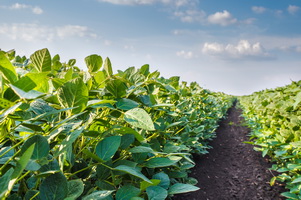
Study: Food Security Needs More from GM Crops
October 11, 2017| |
 A group of agricultural scientists who reviewed how biotechnology developments over the past 35 years have shaped the efficiency of crop production have concluded that genetic modification of plants will be essential to avert future food shortages.
A group of agricultural scientists who reviewed how biotechnology developments over the past 35 years have shaped the efficiency of crop production have concluded that genetic modification of plants will be essential to avert future food shortages.
The team, from Rothamsted Research in the UK and from Syngenta Crop Science and Symmetry Bioanalytics in the U.S. said that genetically modified (GM) crops that repel insect pests or resist herbicides have transformed the farming of soybean, cotton, maize, and canola. These technologies have reduced costs and increased productivity in farming, however, lack of knowledge hinders further improvements in yield, particularly in testing climatic conditions.
"Our knowledge of the genes that limit yield in field conditions needs to be developed," says Matthew Paul, plant biochemist at Rothamsted and leader of the review team. He said that at the moment, there are research results that show promise in the lab, but do not work in the field. Paul said that the potential of GM, genome editing, and emerging chemical technologies need more research so that scientists would know about the many processes and genes that determine yields.
More details are available at Rothamsted Research News.
| |
Biotech Updates is a weekly newsletter of ISAAA, a not-for-profit organization. It is distributed for free to over 22,000 subscribers worldwide to inform them about the key developments in biosciences, especially in biotechnology. Your support will help us in our mission to feed the world with knowledge. You can help by donating as little as $10.
-
See more articles:
-
News from Around the World
- Four-Step Instructions for Golden Rice Adoption
- GM Soybean Oil Causes Less Obesity and Insulin Resistance
- Scientists Point Out that Africa Needs Technological Transformation in Agri
- U.S. Farmers and Ranchers Alliance Engage Consumers on Biotechnology
- Non-browning Biotech Apples will be Available in the U.S. Soon
- Genetically Improving Nutritional Value of Corn Could Benefit Millions
- ICRISAT Scientists Use Double-defense Biotech Approach to Produce Aflatoxin-free Peanuts
- Study: Food Security Needs More from GM Crops
-
Research Highlights
- Nanobody-mediated Resistance to Grapevine Fanleaf Virus in Plants
-
Beyond Crop Biotech
- Scientists Induce Resistance to Asthma in Mice
- Cancer Scientists Decode Durian Genome
-
Resources
- Agriculture and Food Security 5th Anniversary Editorial Tackles Biotechnology
- Updated Pocket Ks on Agri-biotech
-
Plant
- Regulatory Status of Gene-edited Agricultural Products in the EU
- Genome Editing in Potato using TALENs Delivered via Agroinfiltration
-
Read the latest: - Biotech Updates (December 17, 2025)
- Gene Editing Supplement (December 17, 2025)
- Gene Drive Supplement (February 22, 2023)
-
Subscribe to BU: - Share
- Tweet
